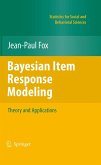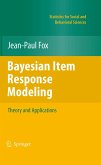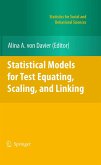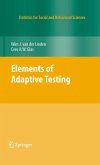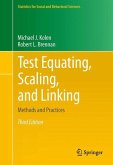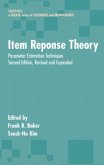In their preface to the second edition of Test Equating, Scaling, and Linking, Mike Kolen and Bob Brennan (2004) made the following observation: "Prior to 1980, the subject of equating was ignored by most people in the measurement community except for psychometricians, who had responsibility for equating" (p. vii). The authors went on to say that considerably more attention is now paid to equating, indeed to all forms of linkages between tests, and that this increased attention can be attributed to several factors: 1. An increase in the number and variety of testing programs that use multiple forms and the recognition among professionals that these multiple forms need to be linked. 2. Test developers and publishers, in response to critics, often refer to the role of linking in reporting scores. 3. The accountability movement and fairness issues related to assessment have become much more visible. Those of us who work in this field know that ensuring comparability of scores is notan easy thing to do. Nonetheless, our customers-the te- takers and score users-either assume that scores on different forms of an assessment can be used interchangeably or, like the critics above, ask us to justify our comparability assumptions. And they are right to do this. After all, the test scores that we provide have an impact on decisions that affect people's choices and their future plans. From an ethical point of view, we are obligated to get it right.
From the reviews:
"Linking and Aligning Scores and Scales is about-making scores from revised tests, different tests, and evolving tests as similar as possible. ... Overall, this is an impressive and important volume. ... It is essential for those who work in the area of educational testing and should be read by those who produce and publish psychological tests. It would be wonderful if members of the media and state superintendents of schools would read it." (Jay C. Thomas, PsycCRITIQUES, Vol. 52 (52), 2007)
"This edited volume gathers some of the finest thinking on the complex topic of score linking. The contributing authors are among the best in the field of psychometrics, and the papers are well written and easy to read. ... Therefore, it offers a great deal of knowledge, insight, and wisdom to researchers and practitioners ... . this is an excellent book and well worth the read for advanced graduate students, researchers, and practitioners with an interest in the field of test score linking and equating." (Lisa A. Keller, Journal of the American Statistical Association, Vol. 103 (484), December, 2008)
"The authors discuss different kinds of linking scenarios in a systematic way. Each topic is addressed by practitioners who have had years of experience in dealing with the practical issues presented in the book. ... This book would serve as a nice textbook for students interested in psychometrics and is a handy reference book for practitioners. I highly recommend anybody who is interested in linking to read the book and keep it as a reference." (Qing Yi, Psychometrika, Vol. 74 (1), March, 2009)
Dorans, N.J., Pommerich, M., & Holland, P.W. (2007). Linking and Aligning Scores and Scales.
" ...I recommend the book to anyone who is involved, even remotely, in test development and design. ...I had the good fortune of attending most of theconference on which this book is based. There was a palpable sense of excitement in the air, and rightly so since some of the most prominent psychometricians were in attendance, summarizing and exchanging views about what was one of the shining accomplishments of psychometrics in the 20th century, namely the development of equating methodology. At the same time, there was a discussion about the immediate challenges raised by current educational tests of the 21st century. The editors and the authors deserve credit for transferring that sense of excitement to the book, a rare accomplishment for edited technical books. The book is a must-read for practicing and academic psychometricians." (Journal of Educational Measurement , Summer 2010, Vol. 47, No 2, pp. 255-260)
"Linking and Aligning Scores and Scales is about-making scores from revised tests, different tests, and evolving tests as similar as possible. ... Overall, this is an impressive and important volume. ... It is essential for those who work in the area of educational testing and should be read by those who produce and publish psychological tests. It would be wonderful if members of the media and state superintendents of schools would read it." (Jay C. Thomas, PsycCRITIQUES, Vol. 52 (52), 2007)
"This edited volume gathers some of the finest thinking on the complex topic of score linking. The contributing authors are among the best in the field of psychometrics, and the papers are well written and easy to read. ... Therefore, it offers a great deal of knowledge, insight, and wisdom to researchers and practitioners ... . this is an excellent book and well worth the read for advanced graduate students, researchers, and practitioners with an interest in the field of test score linking and equating." (Lisa A. Keller, Journal of the American Statistical Association, Vol. 103 (484), December, 2008)
"The authors discuss different kinds of linking scenarios in a systematic way. Each topic is addressed by practitioners who have had years of experience in dealing with the practical issues presented in the book. ... This book would serve as a nice textbook for students interested in psychometrics and is a handy reference book for practitioners. I highly recommend anybody who is interested in linking to read the book and keep it as a reference." (Qing Yi, Psychometrika, Vol. 74 (1), March, 2009)
Dorans, N.J., Pommerich, M., & Holland, P.W. (2007). Linking and Aligning Scores and Scales.
" ...I recommend the book to anyone who is involved, even remotely, in test development and design. ...I had the good fortune of attending most of theconference on which this book is based. There was a palpable sense of excitement in the air, and rightly so since some of the most prominent psychometricians were in attendance, summarizing and exchanging views about what was one of the shining accomplishments of psychometrics in the 20th century, namely the development of equating methodology. At the same time, there was a discussion about the immediate challenges raised by current educational tests of the 21st century. The editors and the authors deserve credit for transferring that sense of excitement to the book, a rare accomplishment for edited technical books. The book is a must-read for practicing and academic psychometricians." (Journal of Educational Measurement , Summer 2010, Vol. 47, No 2, pp. 255-260)



